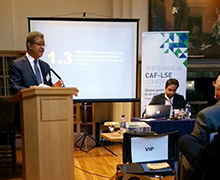news
Leonel Fernández Says Multilateral Organizations Need to Undergo a Process of Profound Change
January 19, 2016
In his lecture, Fernández also made reference to Merrill Lynch and Goldman Sachs publications, which predicted that oil prices could reach $20 a barrel this year, due to falling demand in China as well as the appreciation of US currency, the result of devaluation among such currencies as the Chinese Yuan, the Brazilian Real, and others.
LONDON (United Kingdom) – President of GFDD/Funglode, Dr. Leonel Fernández, suggested that the United
Nations (UN) and other multilateral organizations should undertake institutional re-engineering processes that would enable them to more effectively cope with the complex regional and global issues facing the world today, which he said are characteristic of a multipolar world.
Fernández, who is also president of the EU-LAC Foundation and the former president of the Dominican Republic, expressed these views in a keynote speech he gave at the Third Annual CAF-LSE Global
South Conference – Development Bank of Latin America and the London School of Economics and Political Science. The theme of the conference was “Global Governance in an Era of Uncertainty.”
In his keynote address, “Navigating Through Global Governance in an Era of Uncertainty,” Dr. Fernández recalled that following World War II, the Yalta (Crimea) and Potsdam (Germany) conferences established organizations to arbitrate global
processes. He argued, however, that at the end of the cold war when the bipolar world became a multipolar world, these institutions were left behind.
“Now they must adapt to new circumstances, guided by complex global forces,” said Fernández, who noted that in today’s world sovereign states must act together to control, regulate, and coordinate actions related to global issues of common interest.
He added that, this way, new stakeholders such as NGOs, civil societies, social movements, transnational corporations,
academics, and the media will also be involved through collaborative networks and public-private partnerships.
“This is the essence of world governance in the 21st century,” said Dr. Fernández, while explaining that “it is not about weakening the role of States in terms of their national or foreign issues, but rather collaborating in the common task of navigating uncertainty and controlling global risks.”
However,
stressed that the center of this entire institutional network is the United Nations’ system, with its ability to summon the 193 Member States and its diverse group of organizations that enable it to work in the areas of peace, security, human rights, environment, and sustainable development.
Economy and Fuel
Regarding the economy, Fernández maintained that in the case of Latin America, the so-called ‘golden
decade’ is over, due to China’s economic slowdown, which has reduced the consumption of raw materials and caused export countries in South America to suffer economically.
With respect to the Caribbean and Central America, the political leader noted that the same thing is not occurring because this region has a more direct and closer link to the U.S. economy, which is recovering satisfactorily.
In his lecture, Fernández also made
reference to Merrill Lynch and Goldman Sachs publications, which predicted that oil prices could reach $20 a barrel this year, due to falling demand in China as well as the appreciation of U.S. currency, the result of devaluation among such currencies as the Chinese Yuan, the Brazilian Real, and others.
More on the Forum
The Third Annual CAF-LSE Global South Conference of the Development Bank of Latin America was held to discuss and analyze
issues that have become especially pertinent in view of recent global financial developments.
In addition to President Fernández, other prominent world leaders spoke at the conference, including the President of CAF, Enrique García; former president of the International Monetary Fund (IMF), Governor of the Central Bank of France, Michel Camdessus; and former president of the Inter American Development Bank (IDB), Enrique Iglesias.
The participating
lecturers agreed that from now until 2050, dramatic changes will continue to occur in the world and that they will pose major challenges for the management of national economies as well as global economic and financial systems.







